Listen to this interview at the Mormon Women Project podcast, available on all platforms.
Julie Grygla is the mother of six children under five years old. She and her husband achieved their first pregnancy with the help of fertility treatment, and gave birth to triplet boys. When their triplets were only five months old, Julie became pregnant spontaneously with twin girls, who were followed not long after by a baby boy. Their journey has carried them through many unexpected challenges, but Julie has depended on revelation and patience as she has navigated the abundance of motherhood one step at a time. Her own mother passed away unexpectedly while Julie was in graduate school, before her marriage. Julie has learned how to turn an isolated mourning into a connection with her mother and with God, both of whom she feels increasingly guiding her as her children grow older.
Tell me a little bit about your family growing up.
I’m the ninth of eleven kids. I have seven older brothers, one older sister and then two younger brothers. We grew up in a 1500 square foot house in San Diego, so you know we were on top of each other a lot. We had a very minimalist house, right? My mom didn’t do a lot of kitschy things. We had house plants on top of our piano, a coffee table with a lamp, and family pictures on the wall. But literally there was nothing in the house. I thought, “Oh, well my mom just doesn’t like stuff,” but the truth was that she had so many people in the house she just couldn’t have anything else.
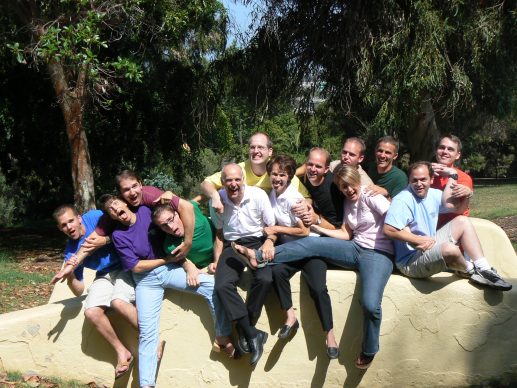
The Bradshaw family
Did you always plan on having a big family?
It sort of cycled for me. When I was in sixth grade, I was chosen to speak at my commencement because I had written an essay with the prompt, “What does the future hold for me?” I had written that I wanted to be a mother and that being a mother was the most noble thing you could do, one of the hardest jobs. At the tender age of twelve, I felt on a really basic level the love that my mother had for us and for what she did.
Of course as I went through puberty those feelings became much more complicated. I started having dreams for myself. I wanted to go to New York City, I wanted to go away to college, I wanted to do all these things, and my parents were just not super supportive because they thought, “Well, why do you need to do those things? You should just want to be a mom.” It was super frustrating for me, and I started being really critical of the path that my mother had taken. “You never did anything! You never went to school!” I remember we had it out one day, and she said, “You know, you really hurt my feelings when you constantly say that you don’t want to be just a mother. That’s all I’ve done with my life. And for you to say that that’s not good enough after I’ve dedicated my life to it…” I’m sure that I had hurt her for years before then, but this was the first time she told me how it made her feel. I felt horrible.
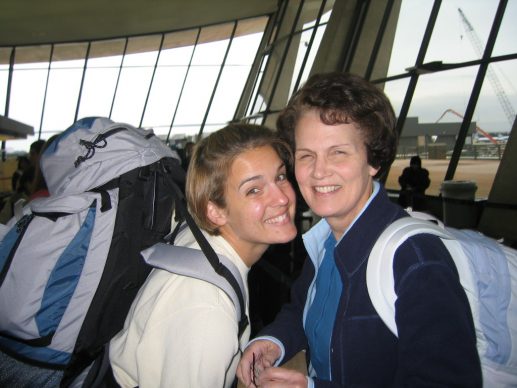
Julie and her mother
That was in my mid-20s, and I had sort of decided I didn’t want to get married. I had all these other things I wanted to do. At that point I had just started graduate school, I was living in D.C., and was finally getting the life that I had wanted, that I felt my parents had denied me. Then my mom reigned me in, and it was the first time I reevaluated what I wanted out of my life. But it was complicated—I was single and I didn’t have a lot of dating prospects because I was in graduate school full time, and I was working full time. It was a very slow shift for me.
When I was younger I always thought, “Oh yeah, I want nine kids,” And then in my 20s it was, “Oh I don’t want any kids.” When I got married, I thought, “I know I should want to have kids, but I kind of don’t want to have kids.” And honestly it wasn’t even until I almost lost the triplets that I realized how badly I actually wanted to be a mother, and that me saying that I didn’t want kids was really me afraid of saying, yet again, that I wanted something that was going to be denied me.
Tell me about your mom. You lost her quite young, before you were even married.
Yes. We’re coming up on eight years, and even though we had rocky points in our relationship, we really had a relationship that most daughters don’t get to have with their moms. When I was in high school, they closed campus for lunch, and I had been going home for lunch for three years. I didn’t even know where any of my friends sat for lunch. And my mom, on the days that she could, would meet me at the edge of campus and we would sit on this grass patch together and we’d chat. I didn’t even worry that people would think it was lame—because she was my mom, but she was my friend.
Even when I moved to D.C., we talked every day, we messaged all the time, we were just really close. We went to England together, and then the next year we went to India together. You know, she died in the MTC—she and my dad were on their way to serve in Belgium and it was going to be the most disconnected I had ever been from my mother. I was so nervous about not being able to talk to her every day, or even once a week. But I remember writing in my journal, “I’m excited to see what these 18 months will bring where I’m not in constant communication with my mother.” After she died I went back and found that, and I was like, “I take it back! I take it back! I don’t want to know what it’s like without her!”
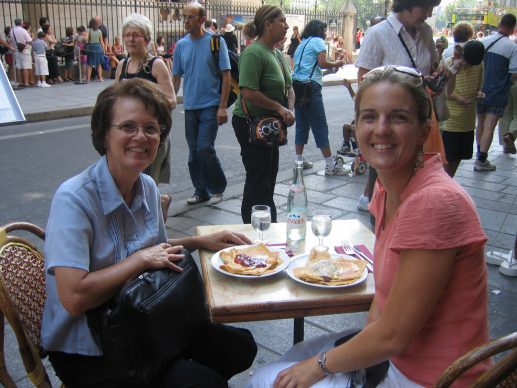
Julie and her mother
What were you doing when all of this happened?
I moved out to D.C. thinking that I needed to get away, do something new and be on my own. So I worked there for a year as a legal secretary, which is how I put myself through college. I went to George Mason and studied English Literature. As part of that I studied two summers in England. It was idyllic. Then I finished and I really had no idea what I wanted to do! So I stayed working at the law firm, and when all of this went down I had actually started another master’s program in Education. I had finally decided to put down roots in Virginia and start my teaching career.
I was in the middle of that master’s program when my parents left on their mission, and I got the phone call from my dad that my mom had passed out in the MTC cafeteria. He’d taken her to the hospital and they didn’t really know what was happening, but it was fairly serious. After her surgery I got on the phone with her and she was barely coherent. I was out on a plane the next morning. From the time she was admitted to the hospital to the time she died was only about a week.
I never could have married Dave without losing my mom, because I never would have been brought down low enough to seek help. My faith was so damaged after my mom died, Heavenly Father knew I didn’t have the strength to be on my knees and ask him for help. So he sent me to a counselor who got me on the right path—although I had to relearn all those lessons when I became a parent! But that’s how it is, right? You master something in one phase and Heavenly Father says, “Good, let’s put a rubber stamp on that. On to phase two!”
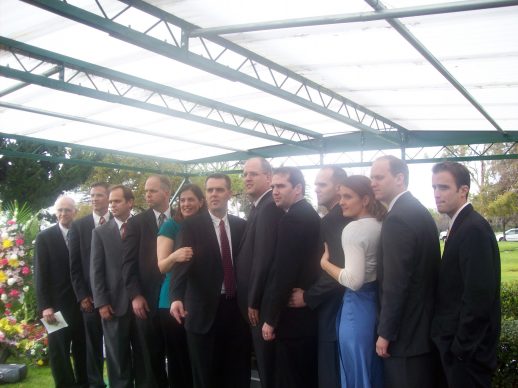
Julie and her family at her mother’s funeral. Her mother passed away while attending the MTC, preparing to serve a mission with her husband in Belgium.
When you and Dave got married, what were your discussions around kids?
I was 31 and Dave was 42 when we got married. On the last day of our honeymoon, we went to these beautiful hot springs in Costa Rica and we knew we were about to head home and begin real life as a married couple. We started talking about what we wanted for ourselves. Before we married, I had planned to be on birth control for at least a year because from the time I met him to when we got married was only five months. So I wanted time. But as we were talking it became very clear that we were not to wait. Neither one of us knew why. We felt really strongly that day that there were three spirits who were anxiously waiting to come to our home. We were so excited about it and said, “Why would we wait?”

Julie married her husband Dave when she was 31 and he was 42. Julie was an English professor, and Dave was a family practice doctor.
So we came home, I went off of birth control and . . . nothing. I was having some pretty severe abdominal pain at the same time, and we really didn’t know—we thought I had celiac, we were taking all of these blood tests and nothing was adding up. Eventually Dave diagnosed me with polycystic ovarian syndrome. He got my on the right medication and all of my symptoms started resolving, but we still couldn’t get pregnant. So, we tried the first round of fertility stuff and did Clomid for 6 months, with no success. We finally decided to see a reproductive endocrinologist, and following his plan we got pregnant, but then I miscarried. People all said, “Oh, I’m so sorry,” but I was just happy I actually got pregnant. So we took a month off to let my body recover and then at the end of the summer, we were ready to try again—and we turned up pregnant.
I was supposed to run the St. George marathon and I woke up so sick. I said, “David, I’m only seven or eight weeks pregnant and I cannot believe how sick I am.” He suggested we go down to the clinic to take a look. He turned on the ultrasound machine and all of the sudden I saw, “There’s two sacks—We’re having twins! I’m so excited!” I thought, “Ok this is a hitch in my natural birthing plans, but we can totally do this!” and he was just silent. I said, “You’re not saying anything,” and he said, “Um… it’s not twins,” and then he focused on the bigger of the two sacks and all of the sudden I was like, “Oh no,” and I burst into tears.
I was devastated. I don’t even feel bad because now that I know as many triplet moms as I do, it’s a very normal reaction to have. Dave was thrilled. He said, “These are the three spirits we felt at the end of our honeymoon!” And I was like, “I didn’t want them to come all at once!”
So we immediately got on with the high risk OB, and I was getting monitored every couple of weeks. Then a ll of the sudden I felt like, “Wait! I don’t know if I even want to be a mom! Do I really want to do this?” I think I was so afraid of losing the pregnancy that I did not let myself get attached to it. At 18 ½ weeks the fluid suddenly was measuring a little bit alarmingly between our identical twins. I had already read about twin-to-twin transfusion syndrome—after one more day of measurements they said it was definitely going in that direction. Then two days later I went into labor at 19 weeks.
When we got to the hospital and they found out I was funneling, Dave just was ashen. In his mind we were going to lose the babies. But he didn’t want to say anything to me. They went into emergency measures. They start me on mag, they schedule an emergency cerclage for the next morning. When I woke up from my cerclage surgery, Dave was kneeling at my bedside sobbing—I had never seen him really cry like that before. He was praying that God would spare our children, and it was only then that I knew there was a very small chance that they would survive.
As soon as they got me stable, we put a loveseat in the back of the minivan we had just purchased, and Dave drove me to Los Angeles to have surgery to save my twin boys. When we got there and they ultrasounded me, they basically said that my little Christian was about 24 hours from dying if we didn’t have this surgery, and even if we did have this surgery there was only a 50/50 chance that he would make it. So the next day we had the surgery and I spent the night in the hospital. That was the worst night of my pregnancy, because I was all alone in this little county hospital in Los Angeles on the labor and delivery floor, and they didn’t even want me there and kept trying to steal my IV. It was just horrible.
It was at that moment I realized what I wanted. I prayed, “Heavenly Father, I want to be a mother. And I want to be a mother to these boys.” And all night, that’s what I prayed. I wasn’t at a point of praying regularly at this point, because I was still only a couple of years out from my mom’s death, and I really wasn’t sure that if I prayed, God wasn’t just going to do what He wanted to do anyway. Even though I had been praying my whole life, I totally misunderstood the whole point of prayer. I thought if I prayed hard enough, God would give me whatever it was I was praying with so much faith for.
The next day we had our ultrasound and Christian’s heart was completely back to normal. I delivered at 30 weeks. My “big boys”—3 pounds and 3 ½ pounds—were in the NICU for six weeks, and then Christian was in for eight weeks.
Now they’re four years old and they never stop talking.
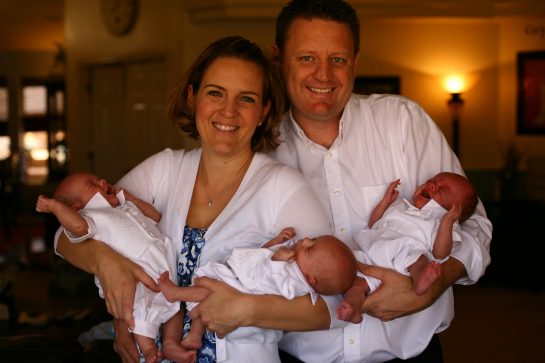
Julie and Dave with their triplet newborns
Who was your village through all of that, especially with the long NICU stays? Who was taking care of your family?
Everybody was super afraid of overwhelming me in the NICU. When I was finally well enough to go back to church, people said, “Oh we’ve wanted to stop by!” I was like, “Please, come by! Hold a baby! Please! They need to be held!” I would hold all three of them whenever I could, but it’s hard. It was long, long days trying to give skin to skin. Then once the word got out, there were a handful of ward members that came regularly. Actually now that I think about it, those are the ladies that are my people. Their kids were all grown up and out of the house, so they had time to come, and they’re still the ladies that come over and visit and sit with us at church.
I didn’t realize until then that the way you form bonds with people is by letting them serve you. And sure, could I have held all the babies by myself all the time? Sure. But it was better for me to have these ladies come and spend their time holding my babies, bonding with my babies, bonding with me. They’d show up at my front door and hold a baby and send me to bed, or whatever.
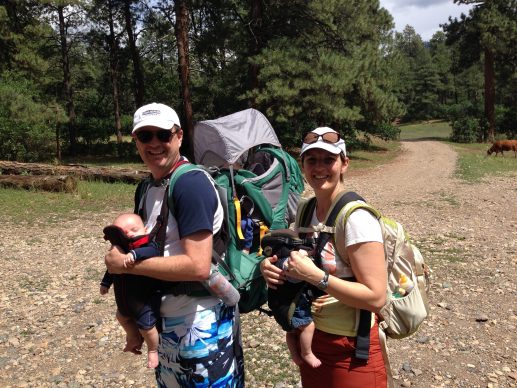
Hiking with the triplets
If you could give some advice to the compassionate service leaders reading this, what did you need? Did you want people to just call you up and say, “I’m coming over?”
No. I just wanted them to show up. If they had called me, I would have said, “No, we’re fine. We’re okay.” But it was when they were listening to the spirit and they followed a prompting of “We should stop by and see the Gryglas,” that I would open the door in tears because things had just started falling apart. My postpartum depression was probably a solid six months after the triplets were born, which is very complicated because by that point I was pregnant with the twins. The first two years of motherhood were really really hard.
I looked at pictures from the girls’ baby blessing the other day and I look horrible. I just think about how tired I was and how wonderful it would have been if someone had said, “I’m gonna come sleep on your couch and why don’t you leave the non-nursing baby with me?” That would have been really great. Bringing meals, finding a way to kidnap an overwhelmed mom to take her to lunch or to get her nails done. You really just have to either know the person really well, or be praying really hard to know what to do, because I was so exhausted that most of the time I didn’t even know what I needed enough to ask for help. I was a first-time mom, and had no idea what I was even supposed to be doing.
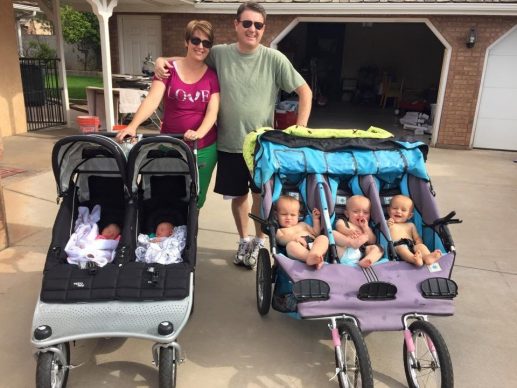
Julie and Dave with their triplet boys and twin girls
When you found out you were pregnant with your twins, your triplets were five months old. How did you feel? Did you feel the same way that you felt when you found out about the triplets?
No. When I was fifteen weeks pregnant with the triplets, my husband woke me up in the middle of the night and said, “I thought you were having a bad dream—you were yelling, ‘No! No! No!’” I started laughing, and I said, “David, I was dreaming that we had just found out we were pregnant with twin girls and the boys were 15 months old.” And he goes, “Honey, that is not a dream, that is a nightmare.”
After the triplets were born we thought, “Well, we’d like to have one more.” It had taken us 18 months with fertility to get pregnant with the boys, so we thought we’d just let what happened happen, and if nothing happened in a year we’d look into fertility again. I really didn’t want to do fertility because I didn’t think I could handle another set of multiples.
So when I had this wave of nausea, I thought, “Noooo. There is no way.” And then that night, Dave said, “Honey, you are glowing today!” and I’m like, “That’s it! I’m taking a test!” I went in and took the pregnancy test. I totally expected it to be negative—do you know how many negative pregnancy tests I had taken? I looked down and it said “Pregnant.” And then I started doing the math and I’m like, “Twin girls…”
I walked out and I handed the test to Dave. After I convinced him it wasn’t a joke, he just looked at me and said, “It’s gonna be twin girls, isn’t it?” and I said, “Yep.” So we just sort of braced ourselves for it. We did the ultrasound, and they were like, “It’s twins!” We said, “We know.” Then they did the gender scan, “It’s girls!” “We know.”
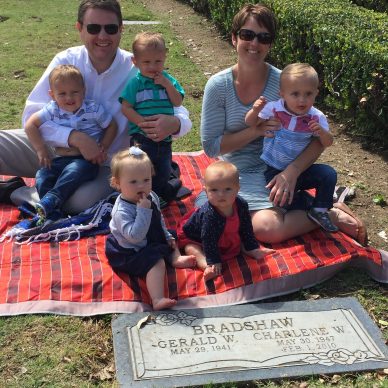
Visiting Julie’s mother’s grave with the triplets and twins
I really feel like the Lord prepared us for every single one of our pregnancies, because if I hadn’t known way, way beforehand, I would have felt like a victim. Instead I just felt God’s love. You make all sorts of promises with God when you want something badly, you start bargaining, but we really felt what we said in our prayers, “Heavenly Father, we will take as many spirits as you have to send to us. We’ll take as many as you want. We’ll take ‘em. Because we realize now, they’re a gift from you. This is clearly out of our hands.”
The girls were born five weeks early. They spent two and a half days in the NICU and came home with me. I don’t really remember that whole first year of their lives! We just were in survival mode.
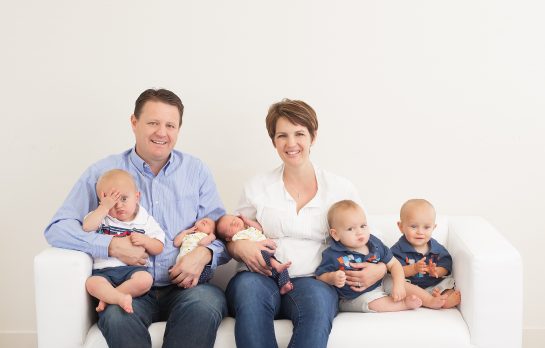
The Grygla triplets and twins
Probably about four months into it, we were at this family reunion, walking down the street and feeling really good about our lives. The boys were sitting in the wagon, I was babywearing the girls, and I thought, “This is it. This is our family.” And immediately…it was like there was someone standing next to me who said, “Julie, there’s one more. It’s a boy. His name is Jonathan.” My initial response was “No!”
But we knew when it was right, and then we couldn’t get pregnant and we had to do fertility again. It was terrifying. I had to have a lot of faith in that voice, that there really was just one. And it was just one, and it was a boy. And so of course we named him Jonathan.
I prayed, “Heavenly Father, is this it?” Because my pregnancies were getting harder and harder. And the answer I received was overwhelmingly, “Yes, this is the last baby. Your family is complete. They’re all here.”
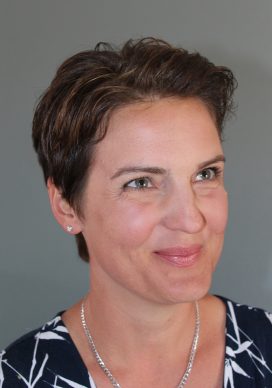
Julie Bradshaw Grygla
How have you had the courage and the faith to do what you’ve done with these children? What has been your strength?
Really, it has been having to live by the spirit. There is no other way. We have been through crucible after crucible. The first hurdle I had to overcome was letting go and realizing that I needed a nanny. Then realizing that my kids were just going to be a disaster in church. That was the second hurdle I had to overcome. People started getting up and bearing their testimonies about how “if the Gryglas can get here, then I can get here,” and I’m like, “Okay! Okay, we’ll still come!” Then it was letting go of my house. I like a clean house. And I just had to let go of that because I was spending all of my time cleaning, and none of my happy hours rearing my children, focusing on the things they needed from me.
Honestly, prayers, scripture study, any sort of meaningful, spiritual activity totally went by the wayside. But I really did not feel any condemnation from God because I knew that He knew that I was just barely holding it together and that I was praying in my heart. The second that I saw my bed, I felt like, “The heart is willing but the body is weak.” I would just fall into bed and that was it.
But in the last few months we have really been through the ringer spiritually, and we realized that God was saying, “It’s time. You are stable enough. You have got to stop just flying by the seat of your pants spiritually and it’s time for you to be purposeful in your study, in your childrearing, in your communion with me because things are just going to get harder with your kids, and you’re not going to make it without me.” It’s a hard conversation to have with your spouse. There was a lot of resistance from both of us because it was going to require growing pains and changes. But we were having some issues with the kids and I said, “David, I don’t have my mother to call and ask her what to do.” And I didn’t really have anybody that I really trusted. So we said, “Ok, we are going to hold each other accountable. We are praying morning and night, we are attending the temple at least once a month, we are reading our scriptures, we are making the Spirit a priority in our home.”

Julie and Dave
It has wrought miracles. I pray in the morning and I don’t even know which kid is going to float to the surface that day. It’s not the same as having a prayer in my heart. The second I hit my knees, I am coming to the Lord in humility and waiting for him to tell me which one of my kids needs me the most that day and what they need from me. It has been remarkable. I don’t think I’ve yelled at my kids in two weeks. There’s just a different feeling in our house, and I feel my mother near.
I know that my mother is teaching in the spirit world. I know that she is busy doing other things, but I also know that there is nothing in this universe that could keep from her from being the ministering angel to her children. Once I stopped with the narrative of, “My mother left me, my mother is not here, I am all alone,” and instead started the narrative of, “My mother is my ministering angel, and if I will listen, she will tell me what I need to do,” everything changed. I don’t feel overwhelmed by motherhood. I feel tired because I’m engaged and mothers are tired. But I don’t feel the crushing inadequacies of being a mother. I don’t feel the loneliness. I feel sustained. I have finally gained a testimony in the last few months of what I’m really doing.
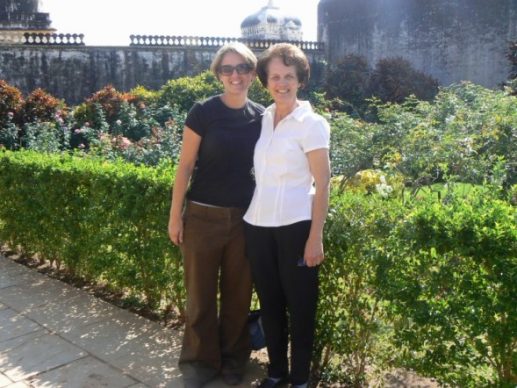
Julie and her mother
Can you tell me a little about what daily life is like with six children under five?
Dave and I have coined the term “industrial parenthood.” When we had six kids in diapers, if one kid got their diaper changed, everyone got their diaper changed. If one kid was eating, every kid was eating. If one kid was taking a nap, every kid had to take a nap. And that was just the only way to make it work. People say, “Wow, you guys are efficient!” And we’re like, “We are a machine!”
We’ve had to individualize things more the older they get, and that’s where Heavenly Father stepped in and said, “Ok, now that they’re not all babies, now that their personalities are showing through, you’ve really gotta get it together. You’re going to need my help.” So that’s really where the Spirit has come in, but it really is just an assembly line. Everybody wears the same thing. All the boys wear the same thing, all the girls wear the same thing. I do laundry twice a week, and everything gets folded into sets. “I don’t care if that’s not the shirt that you want to wear. That’s the shirt that’s in the slot for Monday. When you can start folding your own clothes, you can wear whatever you want!” That’s basically what my life looks like.
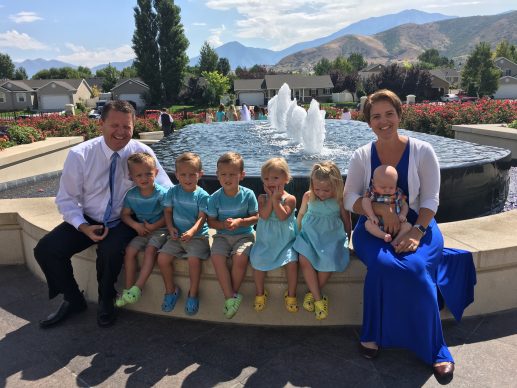
The Grygla family
Is there anything else you would like to share?
The message that I would want to pass on to mothers who are struggling with their purpose, is that you have to give your life over to a life of consecration. You have to gain a testimony that this really is God’s work and glory and that it could not happen without us. To bring to pass the immortality and eternal life of man, mothers have to exist. And mothers have to teach their children—teach them the gospel, but also teach them to say please and thank you, and to recognize that they’re probably going to fail like 50% of the time, but they will get there. You have to take the long view. It’s part of your temple covenants, to live a life of consecration to the building up of the kingdom—and this is it. This is at the very core. That has been my journey of the last four years of motherhood, trying to arrive at that point where I’m not only okay with it, but I’m a missionary for it.
At A Glance
Name: Julie Bradshaw Grygla
Age: 37
Location: St. George, Utah
Marital History: Married at 31
Children: Six children, ages 4, 4, 4, 3, 3, and 10 months
Occupation: Former college writing instructor, now stay-at-home mom
Schools Attended: San Diego State University (bachelor’s), George Mason University ( master’s), BYU (teaching certificate)
Favorite Hymn: Reverently and Meekly Now (185)
Website: http://tacotuesdaytriplets.blogspot.com/
Interview Produced by Meredith Marshall Nelson
